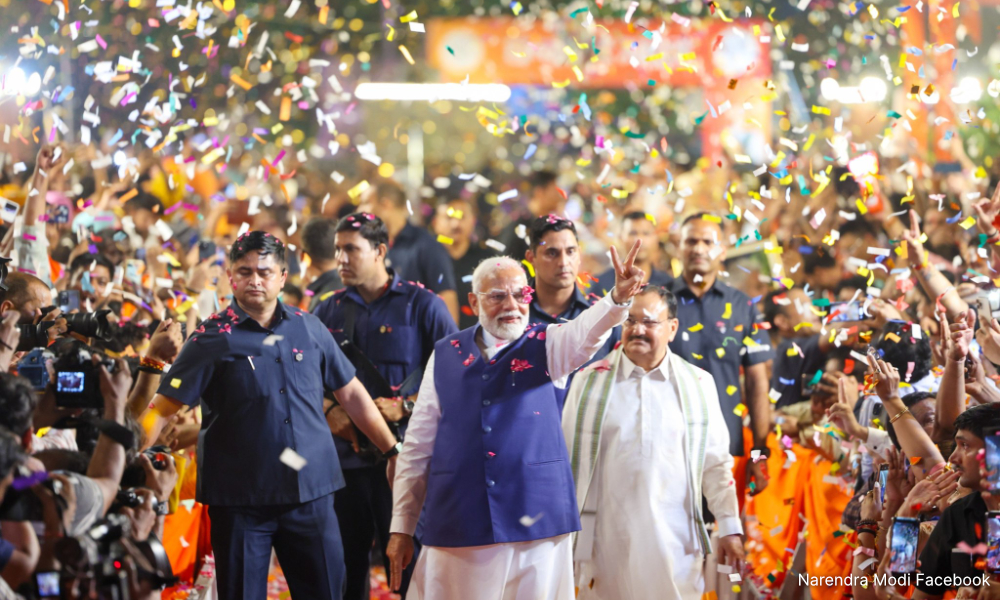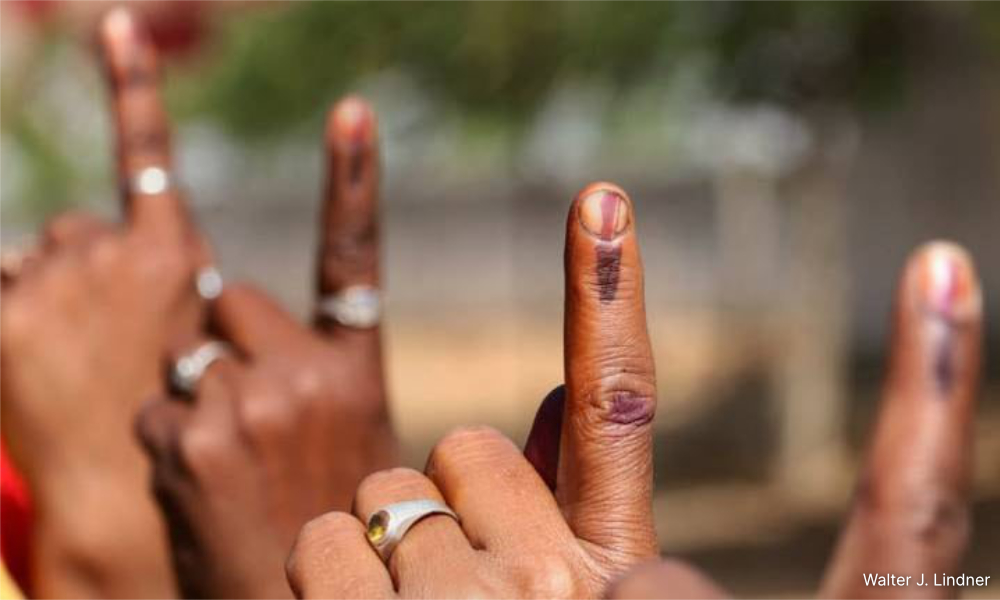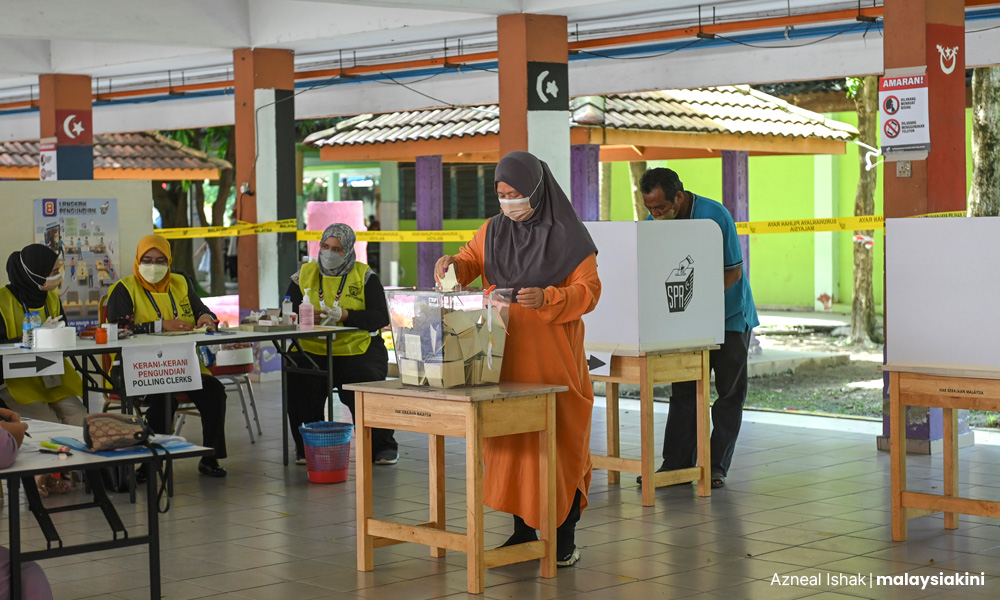Some 650 million voters recently expressed their will in the world’s largest-ever general elections.
Narendra Modi, who had been chief minister of Gujarat for 13 years, and prime minister of India for 10 years, was no longer the invincible Superman that he and his political party, the BJP, held him out to be.
His dominance on the political firmament, first of the state of Gujarat, then of the union of India, throughout this century has been gravely dented.
Modi was boasting success in more than 400 seats in the 543-member Lok Sabha, India’s lower house. He lost 62 seats. The electorate gave him 240 seats: a terrible dressing-down. BJP’s popular vote was less than 37 percent.
The BJP, although the single largest party, could not form a simple majority, which requires 272 parliamentary seats, as they had done in the past decade.
For all his hubris, Modi was compelled to negotiate with five or six smaller or regional parties, with the BJP managing to secure the support of 53 other MPs.
He has just been sworn in again as prime minister, but there are reasonable doubts about the stability of his coalition government, given that a coalition is unchartered territory for Modi’s style of authoritarian governance.
Further, India has an unenviable track record of governments collapsing because politicians and parties acting as king-makers pursue their personal ambitions ruthlessly.
Prime ministers have in the past lasted weeks or months in New Delhi. By way of illustration, the Janata government, elected in 1977 after Indira Gandhi’s emergency rule, collapsed in less than three years because of the clash of powerful egos, and parties with disparate principles.
As in any general election, voters withdraw support for governments for any number of reasons. Election results are determined by complex factors and are always multi-causal. It is simplistic and wrong to attribute one or two causes for such an outcome.

Nonetheless, the fundamental policies of the Modi administration contributed to their poor performance. They included the state-sponsored drive to Hindu supremacy in a secular, multi-religious and plural society; increased authoritarianism; brutal crackdown on dissent; the building of Modi’s personality cult and the intimidation and harassment of opposition parties and their leaders.
Two key factors
Modi’s declared aim is the transformation of India into Bharat, which means a departure from the ideals established by the founding fathers, Gandhi and Nehru.
Nonetheless, the direct and immediate beneficiary of these policies, the majority of Hindus, making up nearly 80 percent of the population, rejected the policies and their architect.
Two examples are sufficient to make the point. In his constituency of the holy city of Varanasi (formerly Benares), Modi’s majority was drastically reduced from half a million votes to 150,000.

Secondly, and more significantly, the Ayodhya constituency. An ancient mosque was destroyed in 1992. On its site, a Hindu temple was constructed. It was opened in January 2024 by Modi, amid a grand fanfare of India’s celebrities, billionaires, cricketers and Bollywood glitz. This ought to have been the safest seat in the Hindu heartland. Yet the BJP candidate lost by some 55,000 votes to a socialist.
The pollsters and the pundits were hopelessly wrong in their prediction of a massive BJP victory, doubtlessly premised on the simple notion that the vast majority of the majority religious group, the Hindus, would continue to blindly and slavishly vote for BJP.
They have had to eat humble pie. Hundreds of millions of illiterate, untouchable, marginalised, poor and uneducated voters spoke collectively to reject Hindutva, and the choking of rights of the minorities, which include not just 200 million Muslims, but also millions of Christians, Sikhs, and Jews.
A sufficient number of voters ̶ which in the context of India run into hundreds of millions - had enough of religious issues and the marginalisation of minorities.
The electorate opted for decency and the dignity of the individual; as opposed to BJP’s hateful religious paranoia. Hence, the ruled and the governed were far more progressive than the rulers and governors. Congratulations on their wisdom.
The Malaysian context
Even more than India, Malaysian politics have been overwhelmingly dominated by communal political parties. Thus, Umno was established in 1946 solely and exclusively for the Malays. MCA and MIC soon followed, solely and exclusively for the Chinese and Indians, respectively. PMIP (PAS’s predecessor) was established in 1950 solely and exclusively for Muslims.
The British colonial power, in pursuance of their divide-and-rule policy to delay the granting of independence for as long as possible, deliberately destroyed political parties that were ideology-based and enjoyed support from all the races of plural Malaya. The fact that most of them were on the left made it politically palatable.
The 1948 Emergency was the final nail in that coffin, with leaders of most political parties (apart from Umno MCA and MIC) being detained, but never charged. From the first-ever elections in Malaya in 1955 until the last general election in 2022, race and religion have been the primary factors in campaigning among politicians and parties and the voting patterns of the electorate.

Thus for 61 continuous and unbroken years since Merdeka, the Umno-led coalitions of Alliance and BN had won successive general elections and governed Malaysia. The 2018 and 2022 general elections, which resulted in a decline of support for BN, still saw millions voting on communal lines.
Umno is still part of the present and previous administrations. The so-called “Green Wave”, which some commentators claim is a new trend, is descriptive of the pull of religion, and the support for PAS.
If one just considers the impact of four political parties of long-standing: Umno, MCA and MIC, as race-based, and PAS, as religious-based, the objective fact is that their leaders continuously and constantly play the race/religion card on every possible issue.
Their raison d’etre is race or religion: in the case of Umno and PAS, both. A dangerous cocktail indeed. They do so because for nearly 80 years, since the opposition to the Malayan Union in 1946, the people of Malaya, and hence the voters support their positions. They are incredible vote-winning issues: a fixed deposit among loyal supporters.
Voters are supreme and sovereign
Putting it another way, if Malaysians do not vote for candidates who espouse racial and religious causes, politicians will cease raising them. Ultimately, the voters are supreme and sovereign.

The old adage that a society gets the government it deserves applies to both India and Malaysia. Hindu voters expressed their displeasure at Modi and his BJP for aggressively promoting Hindu supremacy, to the prejudice and detriment of the minorities. Hence, the majority of Hindus caused a retreat from majoritarianism.
The lesson for Malaysia is that in future general elections, our voters must express their displeasure at candidates who champion race and religious issues.
Instead, our votes must be cast on the track record of and positions taken by candidates on “bread and butter” issues like the economy (particularly, employment, cost of living and the declining ringgit), education, health, and environment, to name a few.
The supremacy of the ballot box should never be underestimated. Those of us in Malaysia opposed to the obsession with race and religion as determinants in the political arena must take comfort in the outcome of the Indian election. If they can do it, so can we. - Mkini
TOMMY THOMAS is a former attorney-general.
The views expressed here are those of the author/contributor and do not necessarily represent the views of MMKtT.




No comments:
Post a Comment
Note: Only a member of this blog may post a comment.